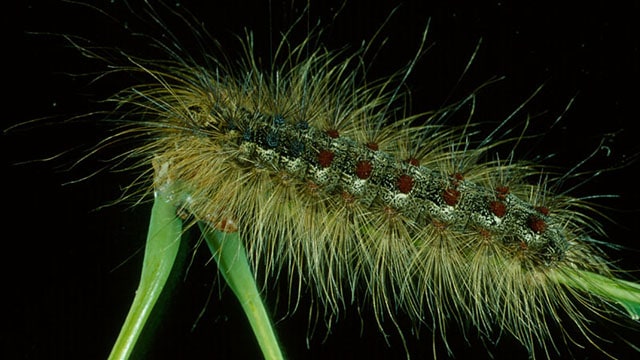Mississauga Takes Action Against “Disgusting” Insect Infestations in the City
Published November 22, 2017 at 7:57 pm

Although you might not be thinking of insects very often these days (they tend to bother everyone a little less in the colder months, unless they’re those immortal house centipedes–gross), you may recall that the City of Mississauga and surrounding municipalities dealt with a very troublesome insect infestation earlier this year.
Now, they’re taking more decisive action to deal with the nauseating menace.
How will it deal with it? By funding an aerial spray program in spring of 2018–an additional mitigation measure to help with the infestations of invasive insects.
The $1.6 million aerial spray program, funded by the city, will target gypsy moths and cankerworms on both municipal and private property in specified areas forecasted for severe defoliation.
“Last year, we experienced an unprecedented infestation of cankerworms across Mississauga. The infestation put a lot of strain on many of our older hardwood trees such as oak, elm and maple,” said Laura Piette, Director of Parks and Forestry. “We also need to address the growing gypsy moth population to ensure the long-term health of our trees in Mississauga. This will avoid putting more stress on our already fragile tree canopy in the identified area.”
Fall cankerworm caterpillars emerge in the spring and often strip trees of their leaves as they feed. This makes trees more susceptible to disease and damage from other insects and extreme weather.
The insects are also unsightly and discourage people from using their yards by virtue of their very existence.
The city says the gypsy moth data forecasts severe tree defoliation in the identified areas. Cankerworm data is being collected now and will help define a more exact aerial spray area.
As for which areas have been hardest hit, the city says the major areas identified include wards 1, 2, 6, 7 and 8.
“Data models and forecasted growth populations suggest we’re going to see a spike in both cankerworms and gypsy moths over the next year,” said Jessica Wiley, Forestry Manager. “We are using a Bacillus thuringiensis (Btk) spray program. It’s an approved product by Health Canada that is used to help control both gypsy moth and cankerworm infestations; however, it’s safe for humans and all other wildlife. We’ve used Btk in the past and have seen success spraying it roughly 10 years ago to manage gypsy moth infestations across the city.”
Staff recommended that Zimmer Air, a Thunder Bay-based company with specialized equipment, be procured to conduct the spray.
The aerial spray program will occur in spring 2018 and a communication plan is being developed to ensure residents in the area receive timely information.
Staff will begin implementing the plan in early 2018.
Cover photo courtesy of Government of Canada
insauga's Editorial Standards and Policies advertising





